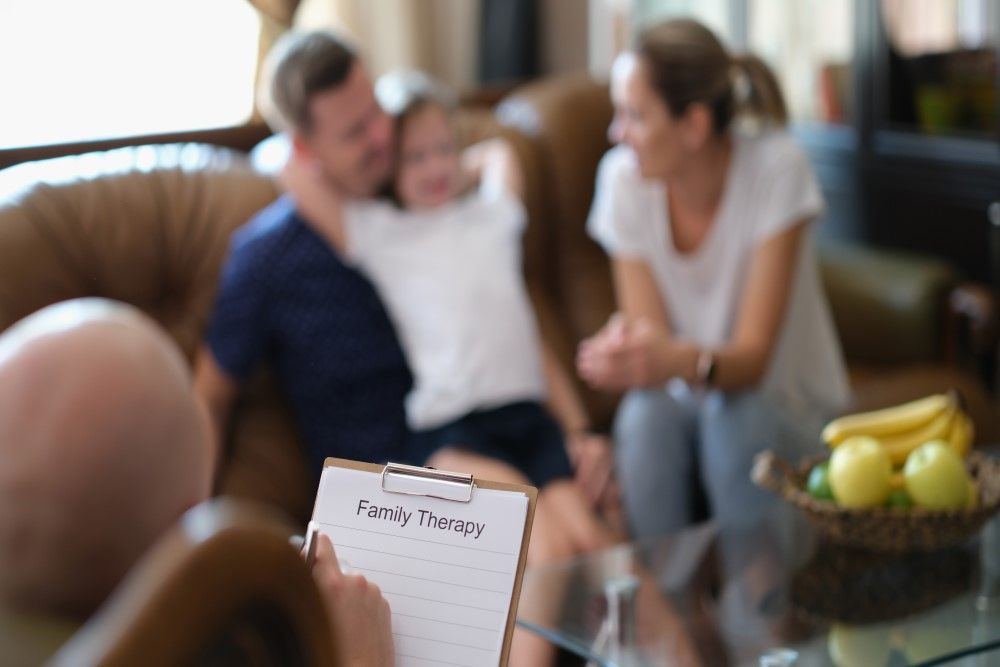
Family therapy is a valuable form of mental/behavioral healthcare that can help families and individuals cope with challenges and adversity.
Unlike individual therapy, family therapy attempts to create change by working with the family as a whole, helping family members improve communication, resolve conflicts, and strengthen relationships. Family therapy has been found to be especially helpful for families experiencing behavioral issues in children, emotional difficulties, and communication breakdowns. It has also been found to be a useful treatment for a variety of mental health conditions, such as mood disorders, conduct disorders, eating disorders, addiction, and many others.
Family therapy involves working with a therapist who helps the entire family understand their roles, feelings, and patterns of interaction. Instead of focusing on one person’s problems, the therapist looks at the family as a whole and how its dynamics may be contributing to the challenges, and what ways the family can help and protect each other as well. Family therapists believe that by changing the family system, individuals within the system will also change.
How Can Family Therapy Help?
- Improving Communication: Therapy helps families learn more effective ways to speak with each other. When everyone feels heard and understood, it reduces conflicts.
- Resolving Conflicts: Whether disagreements are about parenting, rules, family change, or behavior, family therapy provides a neutral space to work through these conflicts in a healthy way and learn to effectively problem solve.
- Understanding Behavior: If your child is acting out or struggling emotionally, family therapy can help uncover the root causes of these behaviors and develop strategies to address those issues.
- Coping with Change or Adversity: Many families use family therapy to help cope with sudden change or adversity in their family, such as moving locations, loss, grief, and divorce. Other families may use family therapy when additional family members arrive, such as a new partner or step-parent, or upon the birth of a new sibling. Family therapy can help members learn to cope with and adapt to this new change.
- Strengthening Bonds: Through therapy, families can rebuild trust, deepen their connections, build empathy towards each other, and create a stronger support system.
- Providing Information: Often families can use family therapy to learn how to help other family members who are struggling with emotional, behavioral, or psychiatric conditions. It may also provide information to family members who want to support a family member who went through a stressful or traumatic experience.
- Preventing Relapse: Family therapy has been found to be helpful for adolescents and adults who struggle with eating disorders, addictions, bipolar disorder, and schizophrenia. Family therapy has been found to reduce the number of relapses of behaviors or symptoms and improve long-term outcomes for the person with the condition.
What to Expect from Family Therapy:
In family therapy sessions, all family members are encouraged and expected to participate. The therapist might ask each family member to share their thoughts and feelings, and the therapist will guide discussions to help identify problem areas and explore solutions. Much like any other therapy, it is at its most effective when all participants are willing to engage with each other. Sessions typically last an hour to ninety minutes, and families may meet weekly or biweekly depending on their needs.
Benefits for Children and Parents:
For children, family therapy provides a safe space to express themselves and feel validated. It can help them understand their emotions and behaviors better. Family therapy may also help them feel less isolated and more supported. For parents, it offers tools for managing difficult situations, improving their parenting skills, and fostering a more positive family environment. Multiple studies have found that family therapy reduces the amount of expressed anger and negative emotions in the family, builds stronger empathy and understanding towards other family members and reduces the amount of behavioral and emotional issues in both children and parents.
If your family is going through a tough time, family therapy can be a powerful tool to help everyone work together toward healthier relationships and a happier home life. It’s a process of growth that can benefit not just children but the entire family.